Exploring Top 16 Alternatives to Notion: Free & Paid Options
Written on
Notion has gained popularity as a versatile productivity and project management application. However, it comes with certain limitations, particularly for large teams and complex projects. These constraints can hinder its effectiveness for organizations that have varied requirements.
In such scenarios, exploring alternative tools that can meet specific needs is essential. Whether you require a specialized note-taking application, a comprehensive task management system, or a no-code solution for custom database creation, numerous options exist that can fulfill your requirements.
If you're contemplating a transition from Notion or seeking a more tailored suite of tools, this guide is designed to streamline your search. We’ve evaluated various platforms to help you identify the best Notion alternatives suited to your needs.
- Baserow
- Evernote
- Microsoft OneNote
- Coda
- Workflowy
- Confluence
- Google Keep
- Basecamp
What is Notion?
Notion serves as an all-encompassing workspace for writing, planning, collaborating, and organizing tasks. It functions as a note-taking tool integrated with database capabilities, project management features, and collaborative tools.
A key advantage of Notion is its adaptability. Users can create pages and sub-pages, structuring them according to their preferences using predefined blocks or templates. These blocks may comprise text, to-do lists, images, links, files, code snippets, embedded web content, databases, and more.
When it comes to project management, Notion allows users to establish and oversee project timelines, tasks, objectives, and deadlines. It offers various views for task tracking, including Kanban, calendar, list, and gallery formats, simplifying project oversight. Furthermore, collaboration is facilitated through real-time editing, comments, and @mentions.
Notion features a template gallery with numerous pre-designed page layouts for tasks such as design specifications, reading lists, meeting notes, and more, providing users with a quick start. Additionally, it supports integration with various third-party applications, including Google Calendar, Google Drive, and Evernote, enhancing its versatility for task management.
Notion offers several pricing plans: a Free plan with essential features, Plus ($8/user/month) with enhanced functionalities like a 30-day page history, Business ($15/user/month) for connecting multiple teams and tools, and an Enterprise plan (pricing on request) that includes advanced security and support.
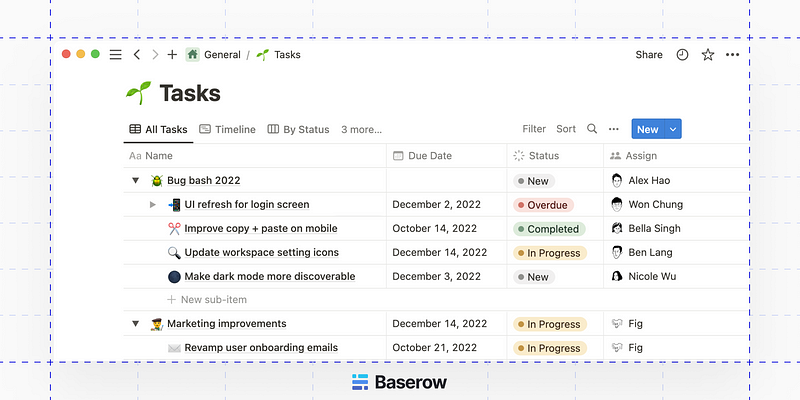
The Limitations of Notion
Despite its extensive capabilities and flexibility, Notion has several limitations that may prompt users to seek alternatives:
- Wiki-type Tool: Notion primarily serves as a wiki tool designed for small teams. It’s more suited for writing documents and jotting down ideas rather than functioning as a structured database, which can become disorganized as the scale increases. For example, users cannot collaborate directly on draft documents as they can in Google Docs.
- Scalability: While Notion is effective for individual users or small teams, it often struggles with performance when utilized by larger groups. As the number of collaborators and content increases, users may experience challenges with organization, access speed, and real-time collaboration.
- Complex Data Management: Although Notion can manage basic databases and spreadsheets, it may fall short for users needing advanced data analysis or processing capabilities.
- Closed Source: Notion's proprietary nature can limit customization options and create reliance on a single company. The lack of access to source code also raises concerns regarding data privacy and security.
- Cost: While Notion is free for personal use, the per-user pricing can quickly escalate for team use, which might pose a financial hurdle for some organizations.
While Notion provides a variety of features for content, project management, and collaboration, its limitations regarding scalability, data handling, and pricing may prompt some users to explore alternatives.
Best Notion Alternatives & Competitors
Baserow
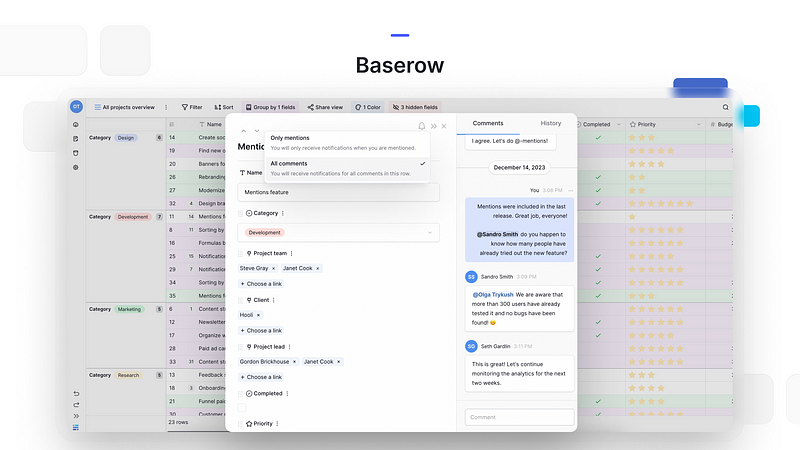
Baserow is a no-code database platform that focuses on data structuring and visualization. Being open-source, it allows for extensive customization, integration with other systems, and the development of tailored features. With an intuitive interface resembling a spreadsheet, it is accessible to non-technical users and supports real-time collaboration.
Baserow provides various views, including Kanban, Gallery, and Calendar, and offers free pricing plans for both hosted and self-hosted versions, with an Enterprise plan available based on specific requirements.
Evernote
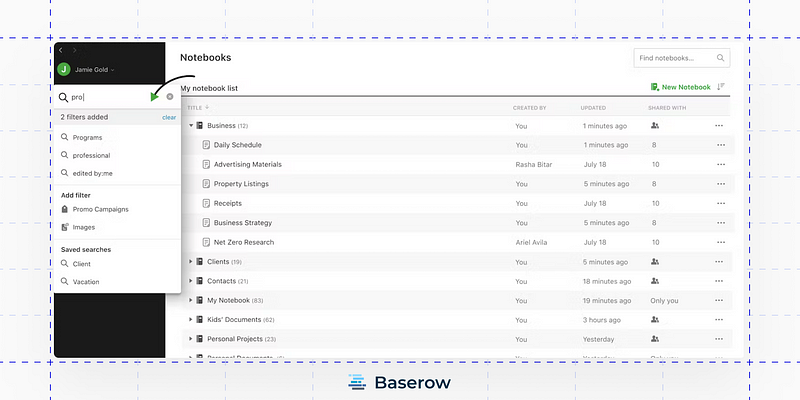
Evernote is a well-known note-taking application that simplifies note creation, editing, and sharing. Though it lacks the breadth of features found in Notion, its strong organizing and archiving capabilities make it appealing for task management.
Users can create various types of notes, organize them into notebooks, and utilize advanced features like document scanning and character recognition. It offers both a free version and paid plans tailored for personal and professional use.
Microsoft OneNote
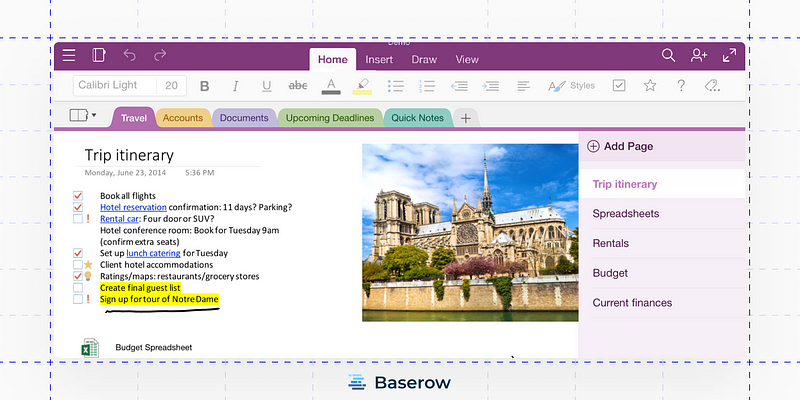
Microsoft OneNote is a free alternative included in the Office Suite, featuring many similar functionalities to Notion. Available on multiple platforms, it allows users to jot down thoughts, create lists, and attach documents while supporting collaborative work.
Coda
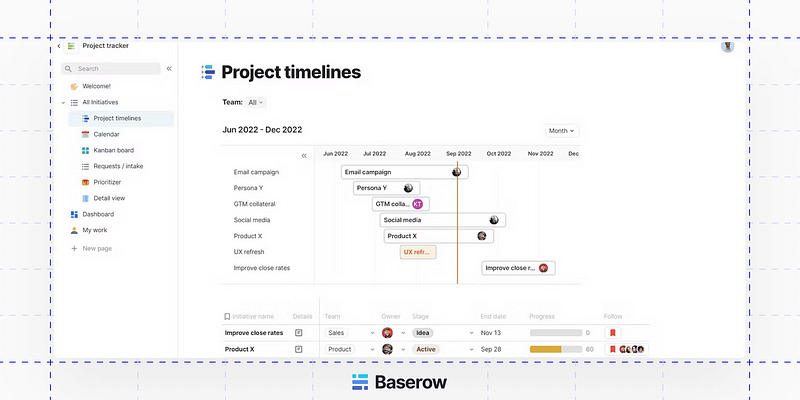
Coda combines document editing, spreadsheet functionality, and advanced database capabilities, allowing users to create interactive documents and complex data structures. It supports real-time collaboration and integration with other applications.
Workflowy
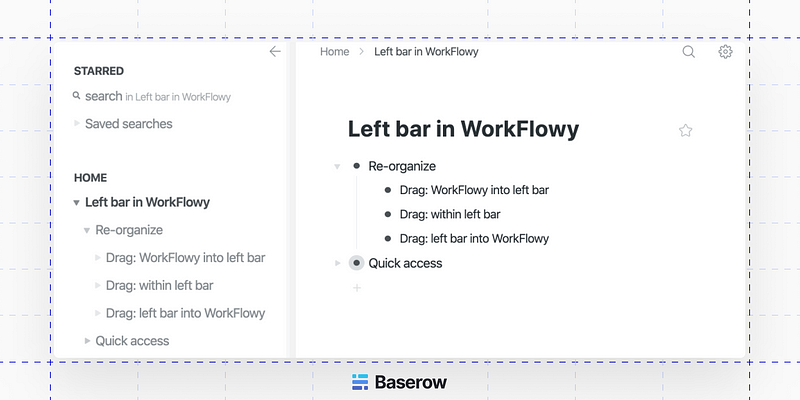
Workflowy offers a minimalist, cloud-based note-taking interface that excels in simplicity. Users can create outlines and lists effortlessly, benefiting from real-time collaboration and user-friendly features.
Confluence
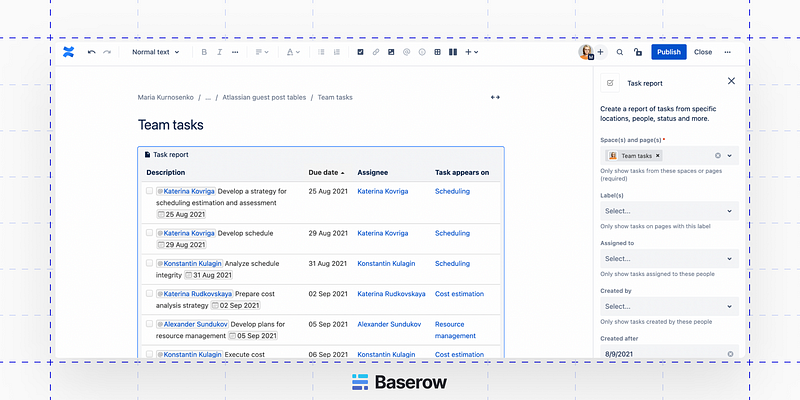
Confluence is a collaborative workspace designed for project planning and documentation. Its robust features make it a viable alternative to Notion, integrating seamlessly with other Atlassian software.
Google Keep
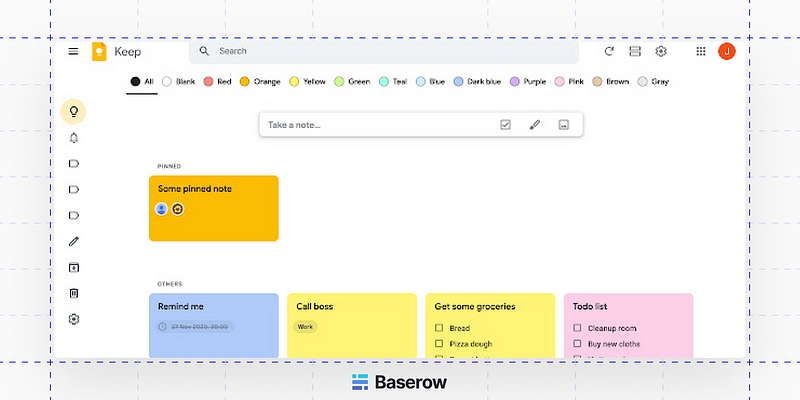
Google Keep is a free note-taking application that syncs with Google Drive, facilitating quick notes, reminders, and checklists. Its straightforward interface and organizational tools enhance usability.
Basecamp
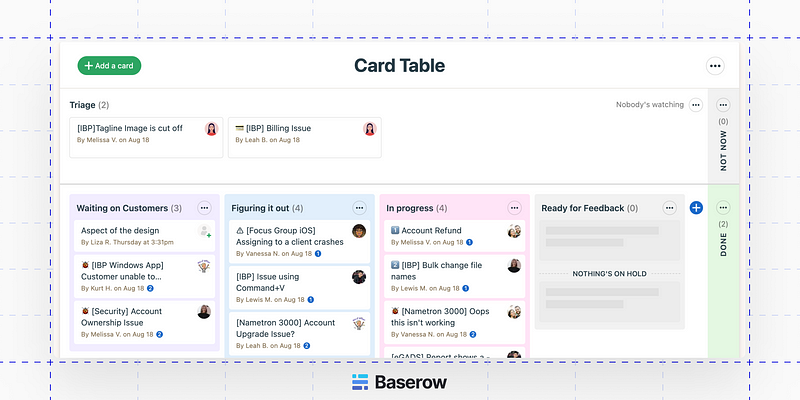
Basecamp focuses on project management with features for task organization and team communication. Its distinct approach to workspace organization sets it apart from Notion.
Microsoft Loop
Microsoft Loop is part of Microsoft 365, designed for note-taking, lists, and task management. It integrates seamlessly with other Microsoft apps, although it requires a subscription to access.
AppFlowy
AppFlowy is an open-source alternative that allows for self-hosting and customization. It offers a suite of productivity tools while ensuring user control over data.
ClickUp
ClickUp is a task-oriented platform designed to unify tasks and processes. It provides various views and integrations to streamline workflows.
Logseq
Logseq emphasizes personal knowledge management with an open-source, local-first approach, allowing users to retain data control and privacy.
Slite
Slite serves as a collaborative knowledge base, integrating AI-powered capabilities to enhance data retrieval and management.
Anytype
Anytype is a privacy-centric workspace app that allows users to store data on their devices, enhancing privacy and offering modular features.
Obsidian
Obsidian focuses on note-taking and knowledge management with a unique interconnected system, allowing users to visualize relationships between notes.
Notesnook
Notesnook prioritizes privacy and offers a rich text editor with dynamic features for note management while maintaining an open-source framework.
Craft
Craft combines note-taking, word processing, and desktop publishing into an organized, user-friendly experience with collaborative features.
So, What is the Best Alternative to Notion?
Selecting the most suitable alternative to Notion will depend on your unique needs and workflows. Whether you value open-source flexibility, extensive project management features, or a minimalist design, there’s an alternative available to meet your requirements.
For those who appreciate open-source solutions, Baserow stands out as a strong candidate. It offers robust database functionalities and a high degree of customization, making it ideal for managing large datasets and adhering to data governance policies.
If you seek simplicity, Google Keep serves as an excellent choice for quick note-taking and reminders. Many of the tools listed provide additional complex functionalities, including project management and collaboration features. The decision ultimately lies with you!
Ready to explore Baserow? Create your account today!
Create a Baserow account
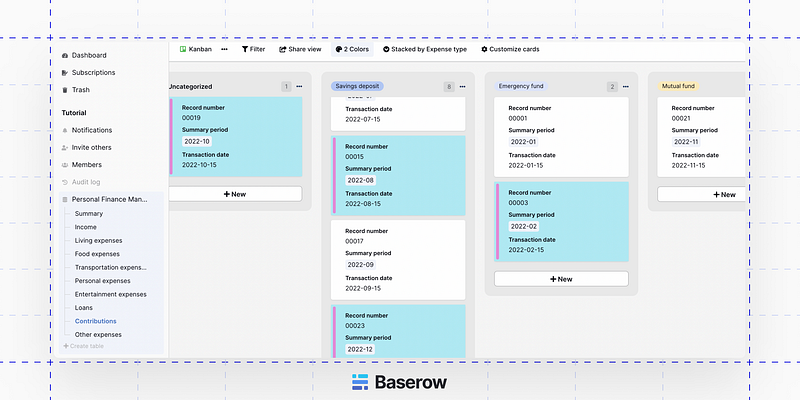
Other Useful Resources
- 24 best low-code and no-code platforms.
- Airtable vs Baserow: The ultimate showdown.
- No-code platforms and why you need them.
- 7 reasons to use a database instead of Excel.
- Databases vs spreadsheets: Which is better?
Baserow is the open platform to create scalable databases and applications without code. Try it today — it’s free!
This article originally appeared on Baserow’s blog. For new feature releases and product updates, subscribe to Baserow’s newsletter.